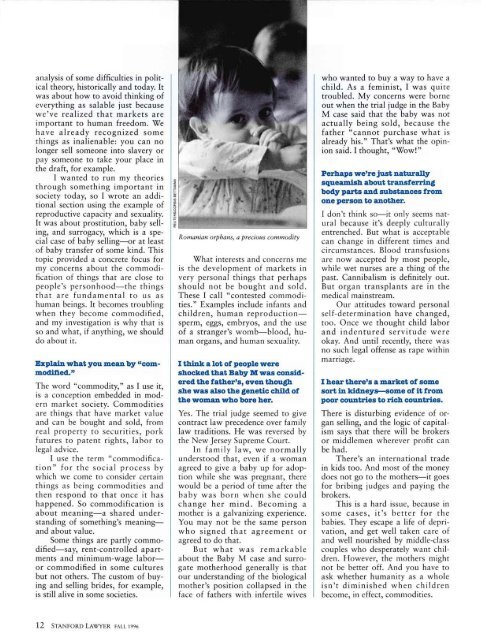Fall 1996 – Issue 50 - Stanford Lawyer - Stanford University
Fall 1996 – Issue 50 - Stanford Lawyer - Stanford University
Fall 1996 – Issue 50 - Stanford Lawyer - Stanford University
Create successful ePaper yourself
Turn your PDF publications into a flip-book with our unique Google optimized e-Paper software.
analysis of some difficulties in political<br />
theory, historically and today. It<br />
was about how to avoid thinking of<br />
everything as salable just because<br />
we've realized that markets are<br />
important to human freedom. We<br />
have already recognized some<br />
things as inalienable: you can no<br />
longer sell someone into slavery or<br />
pay someone to take your place in<br />
the draft, for example.<br />
I wanted to run my theories<br />
through something important in<br />
society today, so I wrote an additional<br />
section using the example of<br />
reproductive capacity and sexuality.<br />
It was about prostitution, baby selling,<br />
and surrogacy, which is a special<br />
case of baby selling-or at least<br />
of baby transfer of some kind. This<br />
topic provided a concrete focus for<br />
my concerns about the commodification<br />
of things that are close to<br />
people's personhood-the things<br />
that are fundamental to us as<br />
human beings. It becomes troubling<br />
when they become commodified,<br />
and my investigation is why that is<br />
so and what, if anything, we should<br />
do about it.<br />
Explainwhat you mean by "commodified."<br />
The word "commodity," as I use it,<br />
is a conception embedded in modern<br />
market society. Commodities<br />
are things that have market value<br />
and can be bought and sold, from<br />
real property to securities, pork<br />
futures to patent rights, labor to<br />
legal advice.<br />
I use the term "commodification"<br />
for the social process by<br />
which we come to consider certain<br />
things as being commodities and<br />
then respond to that once it has<br />
happened. So commodification is<br />
about meaning-a shared understanding<br />
of something's meaningand<br />
about value.<br />
Some things are partly commodified-say,<br />
rent-controlled apartments<br />
and minimum-wage laboror<br />
commodified in some cultures<br />
but not others. The custom of buying<br />
and selling brides, for example,<br />
is still alive in some societies.<br />
Romanian orphans, a precious commodity<br />
What interests and concerns me<br />
is the development of markets in<br />
very personal things that perhaps<br />
should not be bought and sold.<br />
These I call "contested commodities."<br />
Examples include infants and<br />
children, human reproductionsperm,<br />
eggs, embryos, and the use<br />
of a stranger's womb-blood, human<br />
organs, and human sexuality.<br />
I think a lot of people were<br />
shockedthat Baby M was considered<br />
the father's, even though<br />
she was also the genetic child of<br />
the woman who bore her.<br />
Yes. The trial judge seemed to give<br />
contract law precedence over family<br />
law traditions. He was reversed by<br />
the New Jersey Supreme Court.<br />
In family law, we normally<br />
understood that, even if a woman<br />
agreed to give a baby up for adoption<br />
while she was pregnant, there<br />
would be a period of time after the<br />
baby was born when she could<br />
change her mind. Becoming a<br />
mother is a galvanizing experience.<br />
You may not be the same person<br />
who signed that agreement or<br />
agreed to do that.<br />
But what was remarkable<br />
about the Baby M case and surrogate<br />
motherhood generally is that<br />
our understanding of the biological<br />
mother's position collapsed in the<br />
face of fathers with infertile wives<br />
who wanted to buy a way to have a<br />
child. As a feminist, I was quite<br />
troubled. My concerns were borne<br />
out when the trial judge in the Baby<br />
M case said that the baby was not<br />
actually being sold, because the<br />
father "cannot purchase what is<br />
already his." That's what the opinion<br />
said. I thought, "Wow!"<br />
Perhaps we'rejust naturally<br />
squeamish about transferring<br />
body parts and substances from<br />
one person to another.<br />
I don't think so-it only seems natural<br />
because it's deeply culturally<br />
entrenched. But what is acceptable<br />
can change in different times and<br />
circumstances. Blood transfusions<br />
are now accepted by most people,<br />
while wet nurses are a thing of the<br />
past. Cannibalism is definitely out.<br />
But organ transplants are in the<br />
medical mainstream.<br />
Our attitudes toward personal<br />
self-determination have changed,<br />
too. Once we thought child labor<br />
and indentured servitude were<br />
okay. And until recently, there was<br />
no such legal offense as rape within<br />
marnage.<br />
I hear there's a market of some<br />
sortinkidneys-some of it from<br />
poor countries to rich countries.<br />
There is disturbing evidence of organ<br />
selling, and the logic of capitalism<br />
says that there will be brokers<br />
or middlemen wherever profit can<br />
be had.<br />
There's an international trade<br />
in kids too. And most of the money<br />
does not go to the mothers-it goes<br />
for bribing judges and paying the<br />
brokers.<br />
This is a hard issue, because in<br />
some cases, it's better for the<br />
babies. They escape a life of deprivation,<br />
and get well taken care of<br />
and well nourished by middle-class<br />
couples who desperately want children.<br />
However, the mothers might<br />
not be better off. And you have to<br />
ask whether humanity as a whole<br />
isn't diminished when children<br />
become, in effect, commodities.<br />
12 STANFORD LAWYER FALL <strong>1996</strong>
















